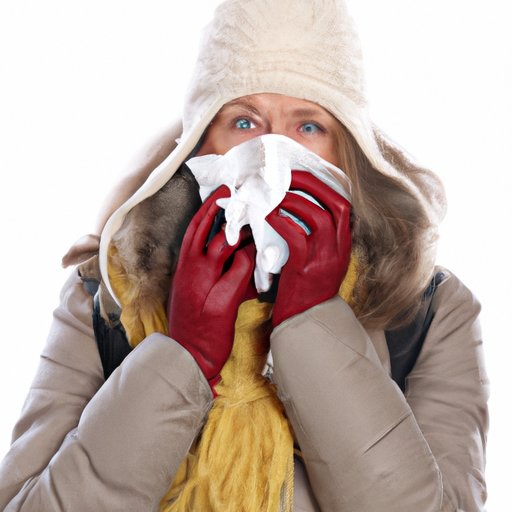
Introduction
Winter is here, and with it comes the fear of getting sick. We’ve all heard the old wives’ tales about how cold weather can make us sicker, but is there any truth to these myths? In this article, we’ll take a closer look at how cold weather affects our health and what we can do to stay healthy during the winter months.
Truth or Myth: Can Cold Weather Actually Make You Sicker?
There are many myths surrounding cold weather and sickness, but the truth is that being in the cold does not actually cause us to get sick. In fact, getting sick is caused by viruses that are spread through the air or by touching contaminated surfaces. However, cold weather can weaken our immune system, making us more susceptible to illness.
According to Dr. William Schaffner, an infectious disease specialist at Vanderbilt University Medical Center, “When you get cold, the blood vessels in your nose may constrict, reducing their ability to clear mucus and viruses out of your airways.” This means that viruses can linger in your system longer, increasing your risk of getting sick.
5 Simple Ways to Stay Healthy During the Cold Winter Months
The best way to protect yourself from getting sick during the winter months is prevention. Here are some tips for staying healthy:
- Wash your hands frequently. Washing your hands with soap and water is one of the easiest ways to prevent the spread of germs.
- Stay warm. Cold weather can weaken your immune system, so it’s important to stay warm. Wear warm clothing, a hat, and gloves when going outside.
- Boost your immune system. Eat a healthy diet with plenty of fruits and vegetables, get enough sleep, and exercise regularly to keep your immune system strong.
- Avoid touching your face. Viruses can enter your body through your eyes, nose, and mouth, so avoid touching your face with your hands.
- Get a flu shot. The flu vaccine is the best way to protect yourself from getting the flu.
The Science behind Our Winter Flu Season: Does Cold Weather Pave the Way for Illnesses?
During the winter months, the air is drier and less humid than in the summer months. This dryness can cause irritation in our respiratory system, making it easier for viruses to infect us. Additionally, we tend to spend more time indoors during the winter months, which means we are in closer proximity to each other and more likely to spread germs.
According to Dr. Schaffner, “Viruses tend to be more stable in cold, dry air.” This means that the viruses that cause the flu can survive longer on surfaces, increasing the likelihood of transmission.
Common Cold or Something More? When to Visit Your Doctor During Cold Weather
It can be difficult to know whether you have a cold or something more serious, like the flu. Symptoms of the flu can include a fever, cough, sore throat, body aches, and fatigue. While a cold typically lasts a few days, the flu can last up to two weeks.
If you have symptoms of the flu, it’s important to see a doctor. According to the Centers for Disease Control and Prevention (CDC), the flu can lead to complications like pneumonia, bronchitis, and sinus infections.
Additionally, if you have a weakened immune system or other underlying health conditions, you may be more susceptible to illness and should see a doctor if you are feeling unwell.
Winter Wellness: How Lifestyle Changes Can Help You Cope with the Cold and Flu Season
In addition to taking preventative measures, lifestyle changes can also help boost your immune system and overall wellness during the winter months. Here are some suggestions:
- Eat a balanced diet. Eating a diet rich in fruits, vegetables, whole grains, and lean protein can help keep your immune system strong.
- Exercise regularly. Regular physical activity can help improve your immune function and reduce stress, which can weaken your immune system.
- Get enough sleep. Lack of sleep can weaken your immune system, so it’s important to get at least seven hours of sleep per night.
- Reduce stress. High levels of stress can weaken your immune system, so find ways to manage stress, like meditation or yoga.
- Stay hydrated. Drinking enough water can help keep your mucous membranes moist, making it more difficult for viruses to enter your body.
Conclusion
While cold weather does not cause us to get sick, it can weaken our immune system, making us more susceptible to illness. The best way to protect yourself from getting sick during the winter months is prevention, including washing your hands frequently, staying warm, and boosting your immune system. If you do get sick, it’s important to see a doctor if you have symptoms of the flu or other underlying health conditions. By prioritizing our health and taking simple steps to stay healthy during the winter months, we can enjoy the season without the fear of getting sick.




